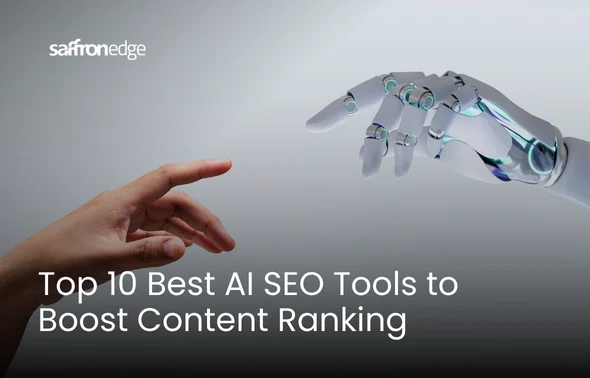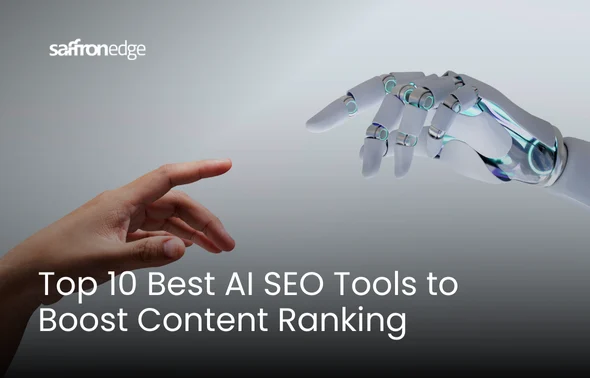Are you aware of the transformation that AI SEO tools bring to your platform, helping you scale your business? Search engine optimization is the key to trends in the digital market.
With the intervention of AI in SEO, competition has become advanced, and choosing the right AI tools should be your priority.
AI tools enable you to complete a large volume of work in less time and forecast outcomes effectively.
In this article, you’ll explore the best AI tools for SEO, both paid and free, with actionable strategies, use cases, benefits, and guidance on selecting the right tool for your needs.
What are AI SEO Tools?
AI SEO tools leverage large language models (LLMs) and machine learning to perform SEO tasks and deliver detailed data insights.
These tools streamline tasks like keyword research, backlink analysis, content research, topic clustering, SERP analysis, search intent analysis, and automation, making them essential for modern SEO AI tools.
For an SEO agency, these AI-driven capabilities add to faster execution and more precise strategy development, enabling teams to scale research, optimization, and performance analysis without sacrificing quality.
By combining human expertise with AI-powered insights, our #1 SEO services can deliver data-backed recommendations, anticipate search trends, and adapt SEO strategies in real time to meet evolving algorithm and user behavior changes.
Comparison of AI SEO Tools
Here’s a brief comparison of AI SEO tools for your evaluation:
Infographic Table Image

Top 10 AI Tools for SEO
1. Surfer SEO
Surfer SEO is a leading AI SEO tool that uses natural language processing (NLP) to analyze top-ranking content and provide real-time optimization recommendations, making it a top choice for content creators.
Best For: Content optimization and SERP analysis.
Key Features:
| Pros | Cons |
|---|---|
| Accurate SERP-based optimization | Higher pricing for full features |
| Integrates with Google Docs | Learning curve for advanced NLP |
Why Use Surfer SEO?
It aligns content with search intent using AI-driven suggestions, ideal for scaling blog posts—e.g., optimizing a 2,000-word article to boost rankings by 30% in weeks.
| Pros | Cons |
|---|---|
| Massive backlink index | No free plan beyond a limited trial |
| AI-powered keyword clustering | Steep pricing for small teams |
2. Ahrefs
Ahrefs is a robust AI SEO tool renowned for its backlink database and AI-enhanced content explorer, offering machine learning-powered insights into competitor strategies.
Best For: Backlink analysis and competitor research.
Key Features:
-
Site Explorer for traffic analysis
-
Content Explorer with AI intent grouping
-
Rank Tracker for performance monitoring
-
Keyword Generator with AI predictions
Why Use Ahrefs?
Perfect for off-page SEO, it uses AI to identify link-building gaps, such as auditing a site’s backlinks to recover lost traffic from algorithm updates.
| Pros | Cons |
|---|---|
| Massive backlink index | No free plan beyond a limited trial |
| AI-powered keyword clustering | Steep pricing for small teams |
3. SEMrush
SEMrush is a comprehensive AI SEO tool that integrates AI for personalized keyword difficulty scoring and content strategy building, empowering full-funnel marketing.
Best For: Comprehensive SEO and content marketing.
Key Features:
-
Keyword Magic Tool with AI suggestions
-
Site Audit for AI-detected issues
-
Position Tracking with predictive analytics
-
ContentShake AI for article generation
Why Use SEMrush?
It streamlines audits and content creation, ideal for agencies tracking multiple clients’ visibility in AI overviews like Google’s SGE.
| Pros | Cons |
|---|---|
| All-in-one AI toolkit | Overwhelming for beginners |
| Strong integrations | Monthly costs add up quickly |
4. SE Ranking
SE Ranking is an all-in-one AI SEO tool offering AI-powered tracking for AI overviews and keyword clustering, making it versatile for agencies and teams.
Best For: All-in-one SEO tasks with AI tracking.
Key Features:
-
AI Overview Tracker for citations
-
Backlink Checker with AI insights
-
Website Audit automation
-
Rank Tracker for multi-engine monitoring
Why Use SE Ranking?
Great for monitoring AI search visibility, e.g., tracking how a brand appears in ChatGPT responses to refine content strategies.
| Pros | Cons |
|---|---|
| Affordable for teams | Limited advanced AI in the base plan |
| White-label reporting | Slower updates for new AI features |
5. Rankscale.ai
Rankscale.ai is a specialized AI SEO tool focused on tracking visibility in AI search engines like Perplexity and ChatGPT, providing precise AI tools for generative search performance.
Best For: AI search engine visibility tracking.
Key Features:
-
Multi-engine ranking analysis
-
Sentiment monitoring in AI mentions
-
Competitor benchmarking
-
Credit-based keyword tracking
Why Use Rankscale.ai?
Ideal for brands optimizing for GEO, such as analyzing citation gaps in AI responses to improve topical authority.
| Pros | Cons |
|---|---|
| Pay-as-you-go flexibility | Accuracy varies by engine |
| Early access to free credits | Niche focus limits broad use |
6. Perplexity.ai
Perplexity.ai is an AI-driven research tool that excels in gathering real-time insights and sources, serving as a free AI for SEO in exploratory keyword and topic research.
Best For: In-depth research and insights.
Key Features:
-
Semantic search with citations
-
AI-powered query refinement
-
Topic clustering suggestions
-
Integration with SEO workflows
Why Use Perplexity.ai?
Useful for content ideation, like compiling sources for an article on emerging trends to ensure E-E-A-T compliance.
| Pros | Cons |
|---|---|
| Free tier with strong results | Pro version needed for heavy use |
| Transparent sourcing | Less focused on optimization |
7. Copy.ai
Copy.ai is an automation-focused AI SEO tool that generates SEO-friendly copy and workflows, streamlining content production for marketing teams.
Best For: Workflow automation and copy generation.
Key Features:
-
AI Writer for drafts
-
Workflow templates for SEO tasks
-
Brand voice customization
-
Bulk content generation
Why Use Copy.ai?
Efficient for scaling social and blog copy, e.g., automating meta descriptions for 50 pages to enhance on-page SEO.
| Pros | Cons |
|---|---|
| User-friendly interface | Outputs may need heavy editing |
| Free plan available | Limited deep SEO analytics |
8. OmniSEO
OmniSEO is a multi-channel AI SEO tool that optimizes for traditional and AI search, offering customized strategies across platforms like Google and social media.
Best For: Multi-channel visibility tracking.
Key Features:
-
Cross-platform ranking monitoring
-
AI-driven schema generation
-
Competitor gap analysis
-
Custom reporting dashboards
Why Use OmniSEO?
Suits enterprises tracking visibility in AI engines, such as optimizing for Perplexity mentions in e-commerce.
| Pros | Cons |
|---|---|
| Tailored to business needs | Custom pricing can be high |
| Broad channel coverage | Requires consultation setup |
9. ChatGPT
ChatGPT is a versatile AI tool for content generation and brainstorming, widely used as a foundational AI SEO tool for quick drafts and idea refinement in 2025 workflows.
Best For: Content generation and brainstorming.
Key Features:
-
Prompt-based article drafting
-
Internal linking suggestions
-
Keyword ideation
-
Custom GPTs for SEO tasks
Why Use ChatGPT?
Handy for initial outlines, like generating a 1,000-word draft on SEO trends, then refining for human touch.
| Pros | Cons |
|---|---|
| Free access and flexibility | Prone to hallucinations without prompts |
| Easy integration with plugins | Not SEO-specific out-of-the-box |
10. Writesonic
Writesonic is an AI-powered writing platform that creates SEO-optimized articles with real-time data integration, positioning it as a top AI SEO tool for efficient content scaling.
Best For: AI article writing and optimization.
Key Features:
-
10-step AI Article Writer
-
SEO Checker with SERP insights
-
Brand voice customization
-
One-click publishing to WordPress
Why Use Writesonic?
Excels in generating full articles, e.g., producing a meta-optimized post on AI tools that ranks quickly after minor edits.
| Pros | Cons |
|---|---|
| Fast, multilingual generation | The interface can feel clunky |
| Integrates with major SEO tools | Free trial limits full access |
Which AI Tools Create the Best SEO Articles?
When it comes to crafting SEO-optimized articles that rank in 2025, not all AI tools are equal.
The best AI SEO tools for article creation combine real-time keyword analysis, search intent alignment, and content structuring to produce high-quality, ranking-ready drafts.
Based on current reviews and performance, here are the top performers among SEO AI tools:
1. Writesonic
This AI for SEO standout uses a 10-step AI Article Writer that integrates with tools like Ahrefs and SEMrush for real-time keyword optimization.
It generates full articles with meta tags and internal linking suggestions, ideal for scaling e-commerce blogs.
Example: Create a 1,500-word post on “AI SEO tools” that ranks in top 10 within weeks. Pros: Fast, multilingual, WordPress integration. Cons: Requires editing for brand voice.
2. Surfer SEO (Surfer AI)
Known for its NLP-driven Content Editor, Surfer AI crafts outlines and full articles based on SERP analysis, ensuring alignment with search intent. Perfect for content marketers aiming for topical authority.
Example: Optimize a blog post to outrank competitors by matching the top-ranking content structure. Pros: Precise SERP alignment, user-friendly. Cons: Higher cost for full AI features.
3. SEO.AI
This tool auto-generates SEO-optimized articles with built-in keyword research and readability scoring, making it a go-to for quick, ranking-focused content. Ideal for small businesses needing bulk posts.
Example: Produce 10 product descriptions optimized for Google in under an hour. Pros: Affordable, fast outputs. Cons: Less customizable than Writesonic.
These AI SEO tools excel because they blend generative AI with SEO-specific features, reducing manual work while ensuring content meets 2025 ranking standards.
Always pair AI outputs with human editing to enhance authenticity and avoid penalties under Google’s E-E-A-T guidelines.
Benefits of Using AI SEO Tools
Using AI SEO tools offers significant advantages:
-
Speed: AI tools streamline tasks like content creation and audits, outperforming traditional methods.
-
Efficiency: Analyzing large datasets or integrating with platforms is faster and more accurate with AI.
-
Scalability: AI adapts to new campaigns, enabling seamless scaling of SEO efforts.
-
Data-Driven Insights: AI delivers precise analytics, uncovering opportunities in less time.
How to Select AI SEO Tools
Choosing the right AI SEO tools can make or break your content marketing strategy in 2025’s competitive digital landscape. To ensure you pick the best SEO AI tools for your needs, consider these key factors:
1. Budget and Pricing
Evaluate your budget to decide between free or paid tools. Free options like ChatGPT or Perplexity.ai are great for startups, while premium tools like SEMrush ($139.95/month) or Surfer SEO ($79/month) offer advanced AI for SEO with robust features for scaling businesses.
2. Specific Use Case
Identify your primary goal—content creation, keyword research, backlink analysis, or AI search visibility. For example, Writesonic excels in article generation, while Ahrefs is ideal for backlink strategies. Match the tool’s strengths to your objectives.
3. Integrations
Look for tools that integrate with your existing stack, such as Google Analytics, WordPress, or Zapier. AI tools like Copy.ai streamline workflows by connecting with CMS platforms, saving time on content publishing.
4. AI-Specific Features
Prioritize tools with advanced AI capabilities, such as NLP for content optimization (Surfer SEO) or generative engine optimization (Rankscale.ai). These ensure compatibility with 2025 trends, such as AI-driven search overviews.
5. User Reviews and Trials
Check platforms like G2 or Capterra for user ratings (e.g., Writesonic scores 4.7/5). Test free trials to assess usability and ROI before committing.
6. E-E-A-T Compliance
Choose AI SEO tools that support human-AI collaboration to align with Google’s Experience, Expertise, Authoritativeness, and Trustworthiness guidelines, reducing the risk of penalties for AI-generated content.
By focusing on these criteria, you can select AI tools that align with your goals, budget, and scalability needs, ensuring efficient and effective SEO outcomes.
Conclusion
In 2025, AI SEO tools like Surfer SEO, Writesonic, and SEMrush are revolutionizing content workflows, from generation to optimization, enabling businesses to outpace their competitors in both traditional and generative search.
Start with free options like Perplexity.ai or ChatGPT for quick wins, then scale to comprehensive platforms like SEMrush for long-term growth.
Experiment with trials to find the best fit, and always infuse human expertise for authentic, ranking-boosting results. Ready to elevate your strategy?
Explore these AI tools today and watch your rankings soar.
Master Content Success with AI Detectors Expertise
With deep expertise in AI detectors, Saffron Services helps brands outsmart AI-generated content, craft authoritative messaging, and dominate digital channels with precision.
Rank in AI Overviews
Frequently Asked Questions
What are AI SEO Tools?
AI SEO tools are powered by artificial intelligence and integrate LLM and machine learning models, enabling organizations and individuals to perform SEO tasks from audits to testing, and every step becomes seamless.
Can Google detect AI SEO content?
Yes, Google can detect AI SEO content. However, it does not penalize AI-generated content unless it’s spammy and low-quality. Even if the content is AI-assisted, it ranks well considering the content is of high quality and value to users.
How to use AI for SEO?
Leverage AI SEO tools like Writesonic for content creation and Surfer SEO for optimization, ensuring alignment with search intent. Combine with human edits to meet Google’s E-E-A-T guidelines for top rankings.
How to choose the right tool from the top AI SEO tools?
Match your goal (e.g., content with Writesonic, backlinks with Ahrefs) and budget, then test AI tools via free trials for integration and E-E-A-T compliance.
Can AI tools be used to improve SEO?
Absolutely, AI can speed up manual tasks like keyword research, content, backlink analysis, competitor research, etc, making your work seamless by helping you perform smarter and not just harder.
Related Blogs
We explore and publish the latest & most underrated content before it becomes a trend.

Subscribe to Saffron Edge Newsletter!

Rank in AI Overviews








